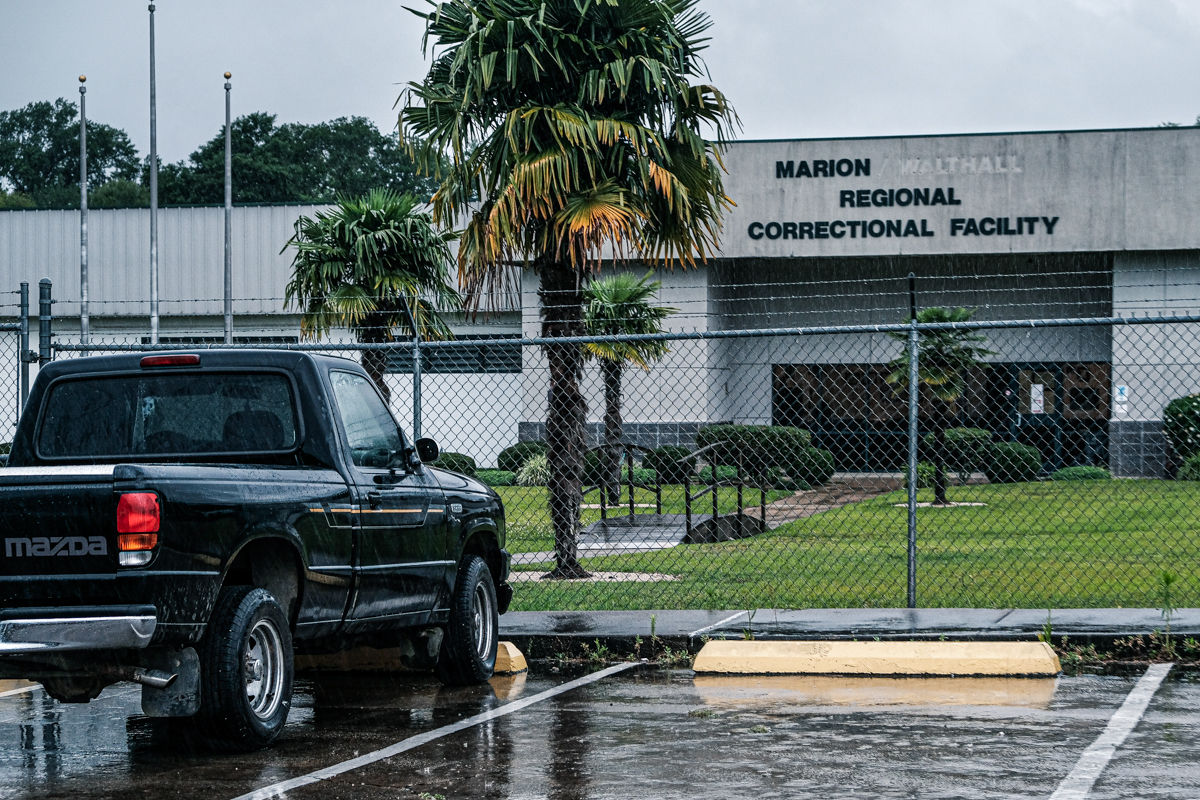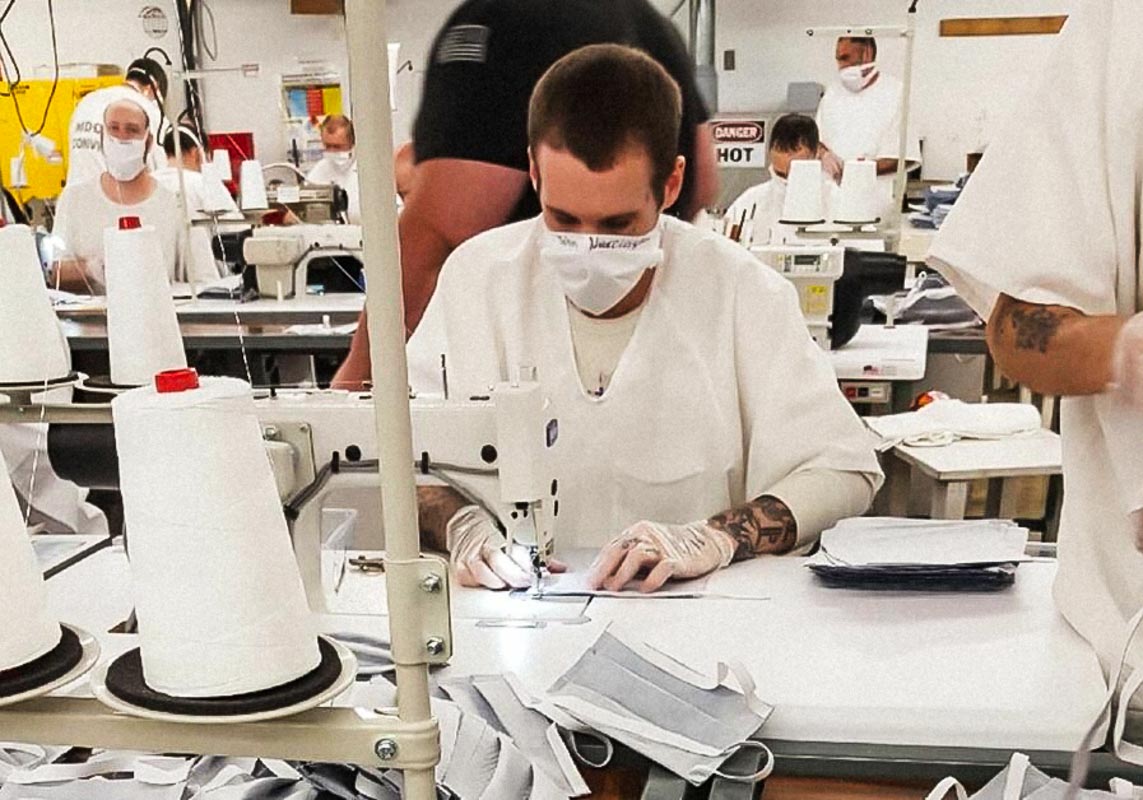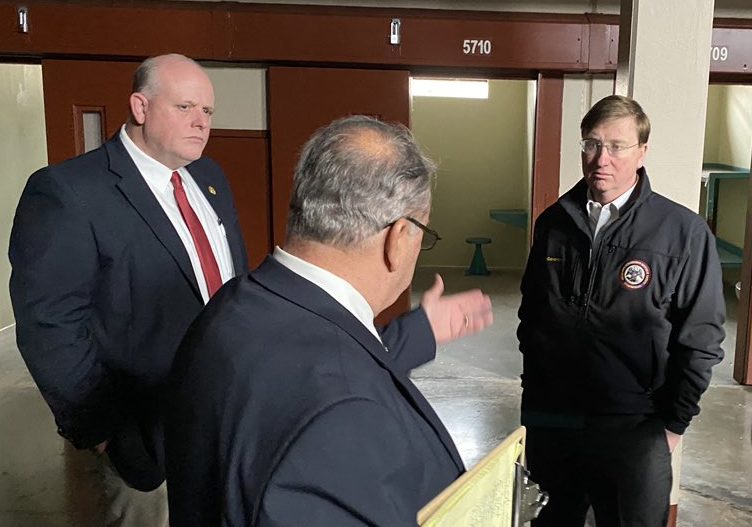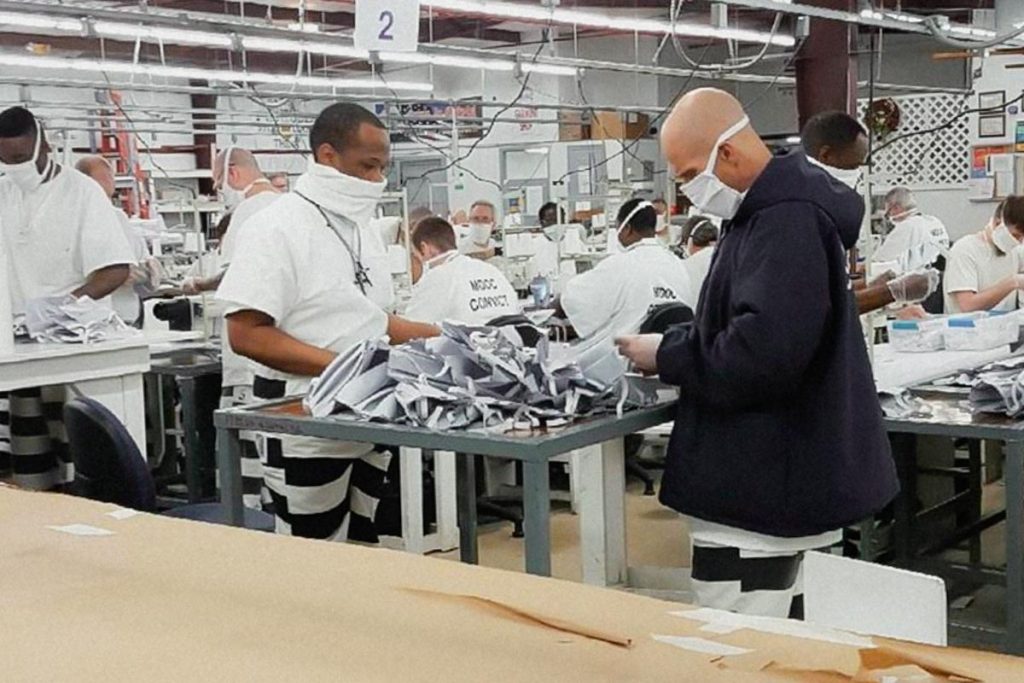Each day, Mississippi prisoners are working to make thousands of masks and gowns to help their fellow Mississippians fight the novel coronavirus pandemic, even as criminal-justice reform advocates warn that their overcrowded facilities are “ripe for the rapid spread of COVID-19.”
In late April, Mississippi Prison Industries Corporation CEO Bradley Lum joined Gov. Tate Reeves at a press conference to extol the inmates’ PPE production efforts, saying “it speaks well of the guys who are in the facilities and are working that they want to be a part of helping our state in this recovery effort.”
Despite that, the governor is rejecting calls from a bipartisan coalition of criminal-justice reform organizations to reduce the State’s prison population. If he does not, the New York-based FWD.us warned in a late April report, nearly every prisoner in State custody could have the virus by May’s end, and around 200 could die.
“Unlike many other states, I do not believe we ought to use the excuse of a pandemic to change our sentencing structure in our criminal justice system,” Reeves, a Republican, said during a press conference on Wednesday.
‘He is Grossly Misinformed’
On Thursday, FWD.us Mississippi State Director Alesha Judkins called Reeves’ decision “terribly irresponsible and dangerous.” FWD.us is a New York-based criminal-justice reform organization that tech industry leaders founded in 2013. Judkins is based in Jackson.
“The governor doesn’t need to look far to see how quickly COVID-19 has spread in facilities across the country, or the projected increase in illnesses and deaths,” Judkins said in a statement. “He is grossly misinformed if he thinks that his action of suspending visitation alone will prevent an outbreak. Failing to reduce the number of people incarcerated in Mississippi will affect not only them, but could threaten the health of all individuals who cycle through prison doors, and the surrounding communities they return to every day.”
FWD.us and other groups had urged him to consider actions like ones Republican governors took in other states, including Alabama and Georgia, to reduce inmate populations and blunt the potential for deadly COVID-19 outbreaks.
“This is a perfect storm, and I’m afraid it only exacerbates pre-existing problems,” J. Robertson, who leads criminal justice reform efforts at the conservative-leaning Empower Mississippi organization, told the Mississippi Free Press last month, noting overcrowding and staffing shortages in MDOC’s facilities. Empower and Reeves often align on other issues, such as his support for private-school vouchers.
In its April report, FWD.us said Reeves could reduce the projected deaths by about 24% “and save thousands from the deadly illness” if he released 5,000 individuals, prioritizing the most “vulnerable” and those “whose punishments most dramatically exceed the nature of the offense,” such as non-violent offenders serving “extreme” sentences.
“While Republican and Democratic governors across the country have heeded the call of public health officials and the Attorney General to release vulnerable people from prison, Governor Reeves continues to jeopardize the lives of every person in MDOC facilities due to his failure to act,” Judkins, the group’s Mississippi leader, said yesterday.
‘Our Incarcerated Loved Ones’

So far, the Mississippi Department of Corrections has confirmed seven novel coronavirus cases, including two at the Marion-Walthall County Correctional Facility; two at the Winston-Choctaw County Correctional Facility; one at the Carroll-Montgomery County Correctional Facility; and two at the Mississippi State Penitentiary at Parchman Farm.
But the State has only tested a handful of inmates. On Wednesday, when MDOC reported a total of only four novel coronavirus cases, Reeves told members of the press that the State had only tested 37 MDOC prisoners. That number is up from three weeks ago, when the State had tested just 20 inmates.
At one of the facilities with known COVID-19 cases, the Mississippi Prison Industries Corporation, through a partnership with Blue Delta Jeans Co., has inmate workers producing the personal protective equipment that Lum, the CEO, mentioned during his presser with Reeves. Prisoners at Parchman are making between 5,000 to 7,000 isolation gowns per day, Lum estimated in April.
Elsewhere, at the South Mississippi Correctional Facility in Greene County, prison workers were producing between 12,000 to 15,000 masks per day at the time, he said.
In an April 29 press release, MDOC Commissioner Tommy Taylor praised MPIC and the inmates for helping fight PPE shortages at medical facilities.
“Not only are these inmates contributing to their own protection and that of other inmates, as we are purchasing some of the masks for our inmate population, they are contributing to the protection of Mississippians across our state,” Taylor said. “Thanks to this partnership, we are able to provide inmates an opportunity to gain skills they can carry with them throughout life while helping in the fight against COVID-19 to care for all in Mississippi.”
Criminal-justice organizations, though, fear that some of their incarcerated loved ones’ lives could be cut short if State leaders do not take the threat to the incarcerated more seriously.
In an open letter to the governor on May 4, the Mississippi Prison Reform Coalition said they “demand” that he release all “juveniles, elderly, and medically fragile persons from custody”; release “all persons granted parole and awaiting release,” those with less than two years left in their sentences, and “all persons held on immigration charges”; provide testing and free protective gear to all prisoners and inmates; and “provide proper medical treatment to all.”

“As Mississippians continue to prepare for the devastating impact of COVID-19 on our communities, we can’t forget about our incarcerated loved ones who do not have the tools needed to protect themselves against this highly contagious and deadly virus. … Medical professionals across the country agree that prisons are a hotbed for infectious diseases because there is no safe way to practice social distancing,” the letter reads.
“The men and women who are incarcerated remain fearful for their lives and are counting on you to help measure that don’t turn their sentences into a matter of life or death,” the letter reads.”
The letter warns that the virus will likely have a disproportionate impact on African Americans, who make up about 61% of confirmed novel coronavirus deaths across the state, despite accounting for only 38% of the overall population. In Mississippi’s prisons, though, more than 60% of prisoners are black.
‘Even More At Risk’ Than Other States
In late April, Robertson told the Mississippi Free Press that reducing prison populations would also protect prison staff who have to interact with inmates daily. While the prisons are overcrowded, they are understaffed by about 50%, increasing the pressure on guards and other prison workers during the pandemic crisis.
“That’s the overarching issue here and the reason that we are even more at risk than lots of other states—because we are so understaffed, and we incarcerate so many people on a per capita basis,” Robertson said. “That’s the number-one priority for the State to look at, and it’s going to be even more important once the Legislature comes back with an even greater challenge to adequately fund MDOC.”
The State already struggles to fund the Mississippi Department of Corrections, and the Legislature will only find it more difficult when it reconvenes in the face of rapidly shrinking tax revenues, he said. Mississippi’s high incarceration rate is a driver of the funding woes, with the state boasting one of the highest rates nationwide. In 2018, the State incarcerated 1,039 residents per 100,000, well above the U.S. average of 698.
MDOC has only confirmed one novel coronavirus death so far—a man at Parchman in Sunflower County on April 16. At least two other inmates have died of “natural causes” since, including a 58-year-old man at Parchman and a 60-year-old man at the South Mississippi Correctional Institution in Greene County. MDOC told the Associated Press earlier this week that it will not announce whether the inmates died of COVID-19 due to privacy laws.
Even before the coronavirus outbreak, when Reeves took office in January, a raft of violent and otherwise preventable deaths plagued Mississippi’s prisons, and the governor conceded that reforms are needed.
“We know that there are people in prison today who do not need to be there. We want to fix that,” he said earlier this year, NPR’s Debbie Elliot and Walter Ray Watson reported.
But not only has the governor shown no will to reduce prison populations, though, he has begun reopening a number of businesses even as the State continues to record record increases in the number of coronavirus cases.
‘A Shift in Strategy’

Restaurants began reopening their dine-in services yesterday, but with some limitations that Reeves kept in place, such as limiting their seating capacity to 50%. Today, the governor announced that he will allow salons, barbershops, and gyms to begin reopening next week.
“The human cost of another Great Depression is higher than the benefit of broad orders. As we work to re-open our economy, that is not a signal that the threat of the virus is gone. It is a shift in strategy because months of making it illegal for small businesses to operate is not sustainable. To the people of Mississippi: I am asking you—begging you—to exercise your personal responsibility,” Reeves said in a press statement today.
The decision came after the Mississippi Center for Public Policy, an influential conservative think tank, publicly urged the governor to reopen salons and barbershops, highlighting stories of individual business owners who have suffered from lost income.
A 17-person commission, which the governor hand-selected, is advising him and offering its recommendations for reopening the economy. The group, known as Restart Mississippi, consists of corporate executives and business leaders, but includes no medical professionals, nor any working class members. A Mississippi Free Press investigation revealed that, since 2008, Reeves has received at least $765,000 in campaign contributions from the appointees and the corporations or organizations they represent.
Mississippi recorded its biggest jump in confirmed novel coronavirus cases today, with 404 new infections. There are now more than 9,000 known cases statewide, and 409 Mississippians have died from COVID-19.
Information on coronavirus prevention measures is available at the University of Mississippi Medical center’s website at umc.edu/coronavirus and at cdc.gov/coronavirus.
The Mississippi Free Press has an interactive map showing diagnosed coronavirus cases across the state and one showing the number of ICU beds in counties across the state.









